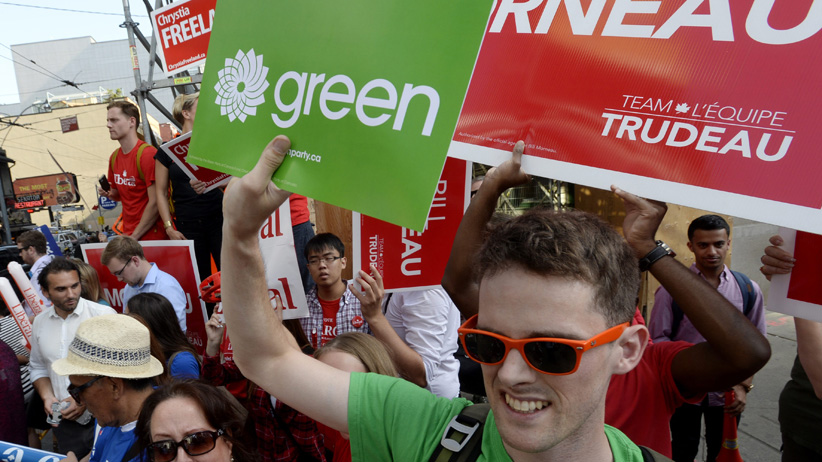The Greens see red in B.C.
A Green candidate steps down, and why? To put his support behind the Liberal. He’s not alone.
Green Party and Liberal Party supporters cheer outside the venue of the first televised leaders’ debate in Toronto on Thursday, August 6, 2015. (Paul Chiasson/CP)
Share

For Jim Stephenson, a former federal and provincial Green candidate with a deep concern about climate change, his party’s nomination of former CBC meteorologist Claire Martin in his North Vancouver riding should be cause for celebration. She is a high-profile, articulate climate scientist who is receiving loads of support and attention from party Leader Elizabeth May. What’s not to love?
Well, everything, in Stephenson’s view. A fine candidate, but in the wrong riding, says Stephenson, who instead has publicly endorsed Liberal candidate Jonathan Wilkinson, a one-time Rhodes scholar and former CEO of several green-technology companies. He says he has a two-fold reason for his defection. Wilkinson is “eminently qualified” to implement the technology needed to fight climate change. “But the real reason is the heartbreak of strategic voting,” he says in an interview. “Our first and highest priority as electors must be to remove the continued threat to our environment that Stephen Harper and his government represents,” Stephenson said in his letter of endorsement, which Wilkinson has reprinted in the local North Shore News.
His concern is that a strong Green candidate risks splitting the “progressive” vote and giving Conservatives a free pass to Parliament. “I wanted to minimize the harm,” he says of his Liberal endorsement. “I wished that Claire had run in another riding where she a) would have had a better chance, and, b) wouldn’t have threatened our nation’s safety.”
Although the riding has been slightly reconfigured in this election, North Vancouver has largely been a battleground between the Liberals and Tories. Conservative MP Andrew Saxton is seeking re-election. A riding-level telephone survey conducted in mid-September by pollster Insights West put Wilkinson ahead with 33 per cent of decided voters. Saxton had 25 per cent of decided support, with the NDP and Greens well back at 11 and 10 per cent, respectively.
Vote splitting is an issue that bedevils Greens in several ridings. In Victoria, Greens are facing heat for running Jo-Ann Roberts, another former CBC personality, against New Democrat incumbent Murray Rankin, an internationally recognized environmental lawyer. A “bizarre choice of priorities,” fumed former NDP strategist Bill Tieleman in a recent column in Vancouver’s 24 Hours. “But for the Greens, it’s apparently become power over principle—because they are determined to remove Rankin rather than crush a Conservative elsewhere.”
In a more extreme case, in the B.C. riding of Kelowna–Lake Country, Gary Adams won the Green candidacy in a contested nomination with the understanding he would then step down and support Liberal candidate Stephen Fuhr, a former Royal Canadian Air Force fighter pilot. To muddy things further, Fuhr switched allegiance to the Liberals after voting Conservative all his adult life.
Although the deal between Adams and Fuhr was finalized in July—in an attempt to thwart the re-election of incumbent Conservative Ron Cannan—it was two months before the Greens’ national office reluctantly relented and allowed Adams to step down. The party won’t run a replacement in the riding. The decision was announced in a news release by Zena Ryder, CEO of the Green riding association. “While Adams will not appear on the ballot, the Kelowna federal Green party executive will not be endorsing or supporting another political party or candidate in order to avoid creating any false impression that the Green party endorses another party,” the release said. Awkward.
“I’m glad this is settled and that we can get to work on campaigning,” Adams told Kelowna’s Daily Courier. “We have a very good working relationship with the Liberals so far.” The deal requires that if Fuhr is elected a Liberal MP, he is to meet regularly with Greens in the district, and press the Liberal caucus to endorse a proportional representation voting system in future elections. A Maclean’s request for an interview with Fuhr or the Liberal riding president went unanswered.
The Greens see the current first-past-the post system as undemocratic, since it often allows a party to form a government with far fewer than a majority of the votes. The Liberals in 2000 and the Conservatives in 2011, for example, formed majority governments with only about 40 per cent of the popular vote. Stephenson also made his endorsement of Wilkinson contingent on pressing the Liberals to maintain their support for electoral reform, “so that voters can vote with their heart, free of strategic concerns.”
Martin often hears concerns about vote splitting when she door-knocks in the riding. She counters that strong Green candidates can increase voter turnout, as was the case when May unseated a Conservative cabinet minister in the Saanich–Gulf Islands riding last election.
Martin says it’s disappointing that Stephenson has “opportunistically abandoned what were once his core principles.” She says she agrees the government needs to change, “however, I believe that ‘insurance voting’ is simply not democratic. Voters in North Vancouver are smarter than Mr. Stephenson gives them credit for. They deserve a choice in this upcoming election that truly represents them, that continues to defend the environment—oh, and that reflects democracy at work.”
[widgets_on_pages id=”Election”]